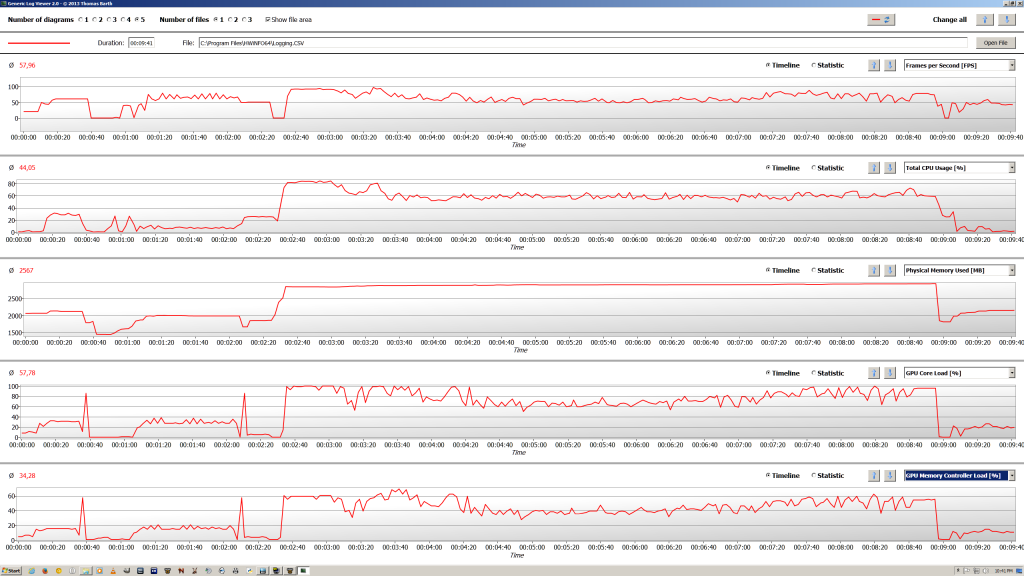HWInfo + MSI Afterburner is a good utility set to have regardless. If you really are getting CPU bottlenecked even after unparking, you could always downclock your GPU, use the spare heat capacity to overclock your CPU using another utility (say, ThrottleStop), then use the on-screen display of your temps to make sure you don't melt your cards down to slag. If CPU botlenecking was the issue, even a +1x multiplier (say, from 16x to 17x) overclock would already give you a 5-8 FPS boost. In addition, keeping some form of FPS cap (if your screen has a refresh rate of 60 Hz nothing above 60 FPS is of any use anyway) not only increases FPS stability but also further reduces heat generation, giving the CPU room to overclock.
Unpark all cores, by default most systems have code that asks half of your computer to sleep while the other half are working, leading to lower efficiency and higher heat.
Once you're in any application that pushes your computer's limits in any way, how you manage the heat of the system is the second most important thing behind how you prevent it from limiting itself (through CPU core parking, through using an alternate graphics card instead of the gaming GPU, through self-throttling from bad coding etc). You'll want to DOWNclock some things that don't matter so you can OVERclock the things that do.
Another thing to check is whether Turbo Boost is kicking in. It could be the cause if your FPS tends to fluctuate (unlikely if constantly low). Intel's Turbo Boost forces some cores to overclock when the demand is given, but at the same time cuts the multiplier to 50% its max value should a core overheat. In the worst possible scenario, some cores are parked and some cores are doing the turbo boost-overheat-turbo boost-overheat cycle.
To disable that, change your advanced power settings under windows such that the maximum processor state allowed is 99%. Its utility is almost nonexistent; I have a conspiracy theory that the only reason why Turbo Boost is in there is so that a system will score higher on a benchmark test that tests for instantaneous max processing speed at any stage, because few computers can run Turbo Boost for more than a minute before overheating and heat-throttling/melting down.
Heat throttling (cutting perf to 50%) can be separately disabled by using a tool such as ThrottleStop, if that's the issue. 75 degrees is a bit suspicious in this regard. All Alienware systems are hard-programmed to throttle CPU core performance to 50% the moment a temperature of 74-76 degrees is reached (depending on where you're measuring the temperature) to avoid overheat-related warranty claims by errant users. This can be ridiculous however, when the temperature needed to run an application safely happens to be, say, 78 degrees. I'm not sure if any other manufacturers also have this practice in secret, I only know it to be true of AW specifically, but it could be a possible reason for a performance bottleneck.
My own rig in particular suffered from Turbo Boost, heat throttling, CPU core parking AND overdriving the GPU and had framerates close to 15 FPS formerly, it's now a stable 40-60FPS in spite of no component changes once all of these problems were eliminated. Given how MWO was the first to fail, fixing it here also boosted performance for Skyrim and Guild Wars 2 significantly, which weren't quite as demanding, as an additional bonus.
If doing any kind of overclocking or throttle disabling, watch your temperatures to avoid burning your computer up. At maximum I recommend average temperatures no greater than 80 degrees for GPU, 90 degrees for CPU, and 70 degrees for PCH (platinum control hub) to be able to deal with heat spikes, even though the max tolerances are a bit more like 90 GPU, 105 CPU and 80 PCH. The higher your temperature goes relative to this limit, the shorter your components' lifespan will be. if you breach the max allowable temperatures your computer should BSOD to protect itself; if it doesn't, it'll meltdown.
Edited by Hayashi, 13 November 2013 - 03:48 AM.





 Hayashi, on 13 November 2013 - 03:19 AM, said:
Hayashi, on 13 November 2013 - 03:19 AM, said:
 DEMAX51, on 13 November 2013 - 09:22 AM, said:
DEMAX51, on 13 November 2013 - 09:22 AM, said: Durant Carlyle, on 13 November 2013 - 08:43 AM, said:
Durant Carlyle, on 13 November 2013 - 08:43 AM, said: